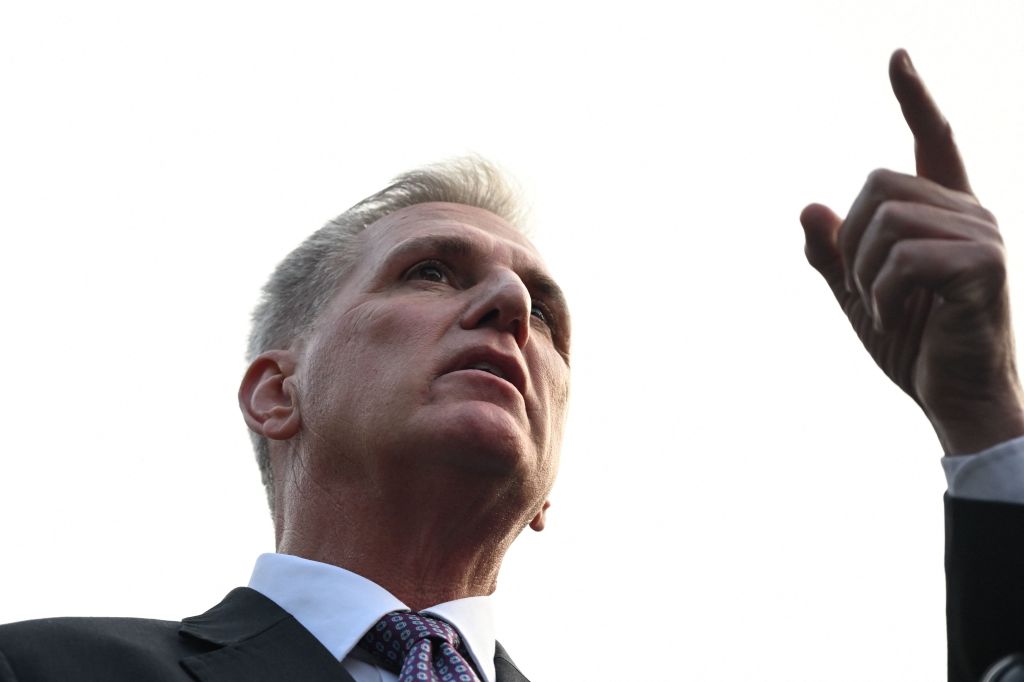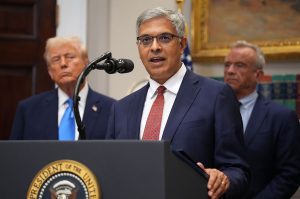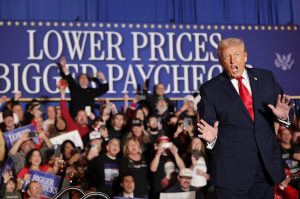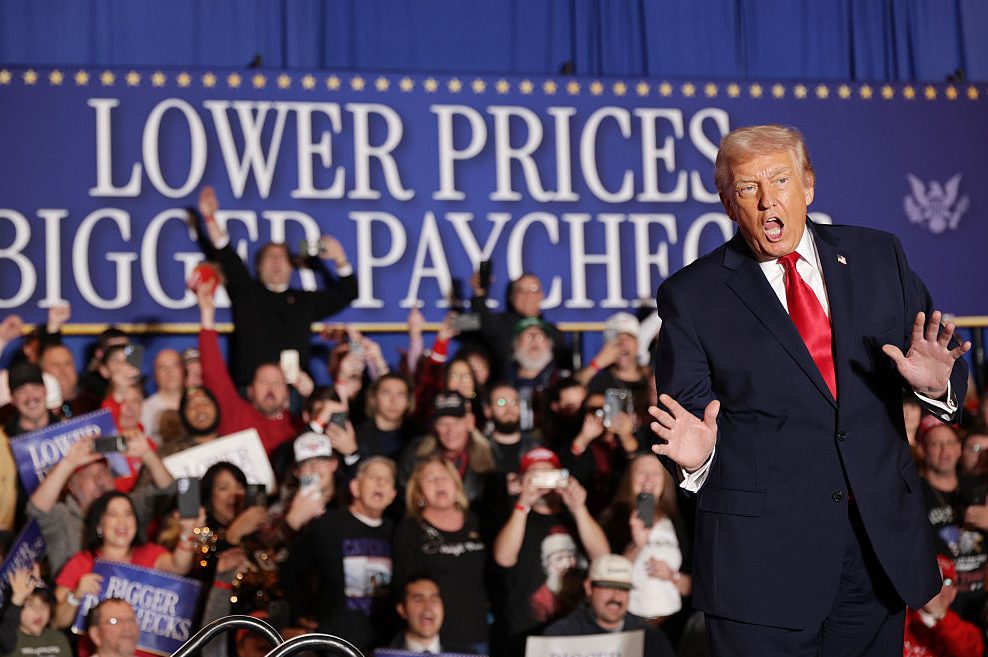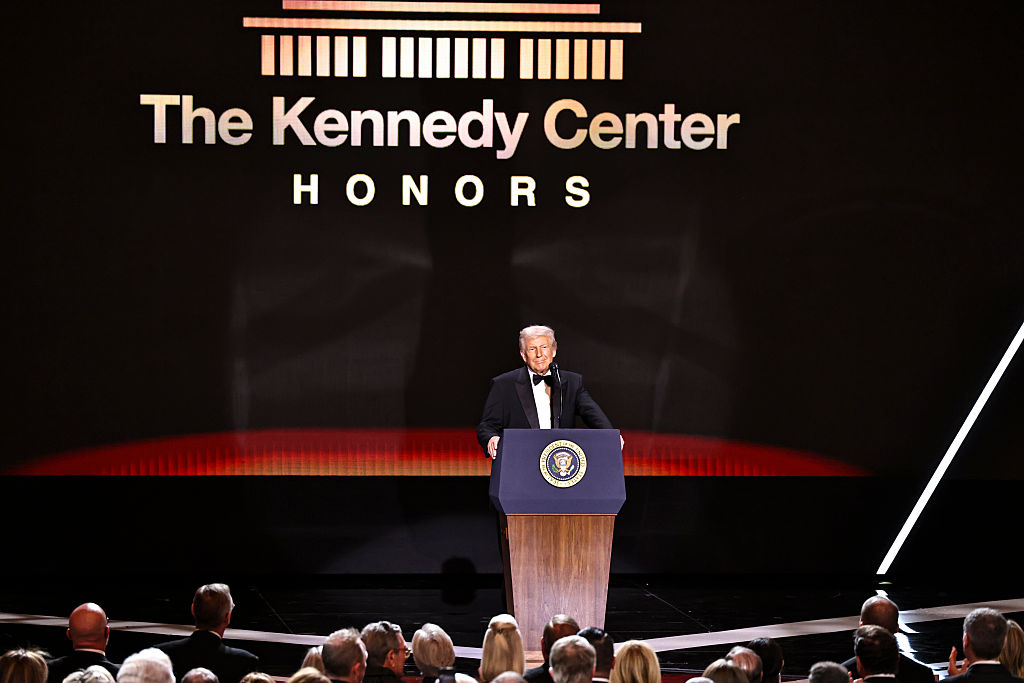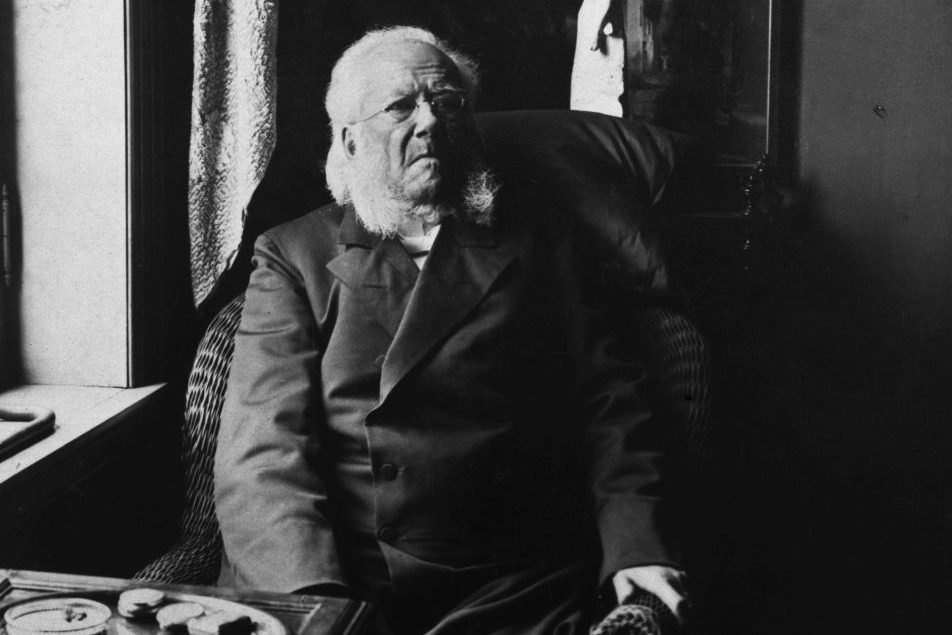Welcome to a later-than-usual debt-ceiling brinkmanship special edition of the DC Diary. The mood music was encouraging as Kevin McCarthy and Joe Biden sat down for talks in the Oval Office this evening. “We still have some disagreements, but I think we may be able to get where we have to go,” said Biden to pool reporters. “We both know we have a significant responsibility.” McCarthy was similarly positive.
Hours earlier, treasury secretary Janet Yellen wrote to lawmakers telling everyone what they already knew: that the US is “highly likely” to run out of money to pay all its bills if “Congress has not acted to raise or suspend the debt” as early as June 1. Not news, exactly, but an effort to focus minds. Earlier in the day next day, McCarthy told reporters on the Hill that “we could get a deal tonight, we could get a deal tomorrow, but you’ve got to get something done this week to be able to pass it and move it to the Senate.”
Positive noises from both sides plus a clock ticking closer to midnight: the signs pointed to the possibility of a breakthrough meeting this evening. But no white smoke appeared above the White House when talks ended at around 7 p.m. Instead, more encouraging talk: “I think the tone tonight was better than at any other time we’ve had discussions, McCarthy told reporters immediately after the meeting, before singing the praises of the president’s negotiating team. “We both agree that we want to come to an agreement,” he added. “There’s nothing agreed to.” As for the major differences that remain, McCarthy ruled out any tax rises, something Biden had suggested in his remarks to reports just before the meeting.
So far, McCarthy has maneuvered expertly in this debt fight. He united an unruly conference to pass legislation on the debt limit — something the White House was betting he would not manage. (As Reihan Salam wrote in the Atlantic recently, the Limit, Save, Grow Act offers a mild kind of fiscal conservatism; the tea party is very much over.) Democrats have been flat-footed ever since, with the president having to abandon his insistence that only a “clean” vote on the debt limit would do. McCarthy would then notch up another win, cutting out Democratic lawmakers and Senate Republicans to put himself center stage alongside Biden.
The strategy is paying dividends for McCarthy personally — a recent poll put his net approval rating at +8 — while it is internal divisions among Democrats, not Republicans that have come to the fore in recent days.
Over the last week, Biden has veered from echoing Republican and moderate Democrat messaging on the need to cut spending to flirting with the unconstitutional 14th Amendment option preferred by his party’s left wing. “I think we have the authority,” Biden said in Hiroshima Sunday before jetting back to Washington. In the past, administration officials have described the move as something that would trigger a “constitutional crisis” (Yellen) and that the White House would not entertain (Karine Jean-Pierre).
The sudden change of tone was only the latest demonstration of Biden’s wobbly position in these negotiations. Biden’s attempt to characterize Republican calls for fiscal constraint as MAGA extremism has been rendered unconvincing by McCarthy’s legislative accomplishment and evidently willingness to reach a deal.
After this evening’s meeting, Patrick McHenry, the North Carolina lawmaker and McCarthy’s lead negotiator, said he sensed a “lack of urgency” from the White House. But the White House appears to realize that McCarthy has them right where he wants them: with a failure to reach a deal hitting the president and his party at least as hard as the Republicans. That political reality, brought about by McCarthy, is what got Biden to the negotiating table. And it is what means he has every reason to find a way to a deal in the coming hours and days.
On our radar
JEREMY CLARKE, 1957-2023 Jeremy Clarke, who wrote The Spectator’s Low Life column for twenty-three years, died on Sunday morning at his home in Provence. He was sixty-six. In his tribute to Jeremy, Fraser Nelson writes: “Our readers have lost not just a columnist but a friend — and he will be mourned as such. He was one of the greatest writers ever to appear in our pages. But he was also so much more.”
GORSUCH ON PANDEMIC RESTRICTIONS Supreme Court Justice Neil Gorsuch called America’s Covid-era restrictions one of “the greatest intrusions on civil liberties in the peacetime history of this country.” The unsparing verdict came in a statement from the judge attached to an unsigned order in response to an appeal to the end of Title 42, the pandemic measure used to simplify and speed up border expulsions.
SCOTT ANNOUNCES, THUNE ENDORSES, TRUMP… ENCOURAGES? Tim Scott announced he is running for president today in a speech in North Charleston, South Carolina. (Ben Domenech offers his take on Scott’s candidacy here.) The senator’s bid got a launch-day boost from John Thune: the GOP number two in the Senate endorsed Scott. Trump welcomed Scott to the race, using the announcement as a chance to prod Ron DeSantis. “Tim is a big step up from Ron DeSanctimonious, who is totally unelectable,” said Trump in a post on Truth Social. “I got Opportunity Zones done with Tim, a big deal that has been highly successful. Good luck Tim!”
*** Sign up to receive the DC Diary in your inbox here ***
Biden’s ‘thaw’ is all jaw-jaw
The G7 Summit in Hiroshima, Japan, which concluded on Sunday, put out a statement that took China to task for its hostile economic practices and destabilizing behavior. But President Biden struck a different tone. He ended his trip by suggesting that US-China ties would “begin to thaw very shortly.”
The comment follows meetings between national security advisor Jake Sullivan and China’s Wang Yi intended to bring about that very “thaw.” The administration has also floated the idea of lifting sanctions on Chinese minister of national defense Li Shangfu, who was hit with them in 2018 due to his directing the purchase of Russian defense articles. Supposedly, this is to entice the Chinese back into greater communication between both countries’ militaries, which Beijing has refused for months.
Biden risks repeating a classic mistake of American foreign policy, particularly by progressives, whereby the US makes conciliatory gestures and offers significant concessions with little tangible or commensurate benefit. Military-to-military communication is critical, not least because it helps to minimize the chances of miscalculation. If connections can be re-established, then they should be. However, China is the one being reckless here: it is refusing to communicate — and hoping to use its refusal to goad Washington into giving Beijing what it wants. Communications were present until recently, but Li has been sanctioned for years, so the connection between the two issues is manufactured by China.
Biden can suggest thaws however much he wants, but because the CCP — not America — is the problem, there is not much the president can do unless Xi Jinping decides he wants better relations.
–John Pietro
Does Jill Biden get to pick the next NATO chief?
British defense secretary Ben Wallace has confirmed the worst-kept secret in Westminster: he’s the likely UK candidate for the secretary-general of NATO. Speaking in Berlin on Wednesday he told reporters: “I’ve always said it would be a good job. That’s a job I’d like.” It’s a position that falls vacant in October and Wallace has a good claim, having been in his role for nearly four years, one of the few to emerge with credit from the Kabul evacuation, and has won plaudits for fighting the Whitehall machine to equip Ukraine before Putin’s invasion last year.
Cockburn learns however that a surprising obstacle is standing in his way: the first lady of the United States. Jill Biden wants a woman in the role. And she thinks a senior female figure from one of the Baltic states, which believe that if Ukraine falls they will be at war next, would fit the bill.
The role of the first lady is something of an American oddity. But Cockburn can’t help wonder why Dr. Biden — an intellectually underwhelming academic with a PhD in educational leadership — might think she has insight into western security, especially at a time when NATO is doing almost everything possible to stop Russia in Ukraine. But “woke is woke” and there’s never been a woman NATO secretary-general. For Team Biden, the enemy is the patriarchy as much as Putin.
So who, in Jill Biden’s identity politics worldview, is the right woman for the job? Word is that Dr. Biden may have her eye on Kaja Kallas, prime minister of Estonia since 2021. She’s at the hawkish end of the spectrum (arguably she marks the end of that spectrum) and comes as close as she dares to accusing Emmanuel Macron of being a Putin apologist.
The Germans, already worried about public opinion in the East, would be deeply resistant to giving the outspoken Kallas such a platform — fearful that she’d give Moscow all the ammo they want to portray NATO as a hostile force on the brink of invading Russia. Wallace is robust but more circumspect and diplomatic. But he’s a he.
Three of NATO’s thirteen bosses have been Brits and Wallace (whose parliamentary seat is being abolished) has long harbored dreams of following in the footsteps of Ismay, Carrington and Robertson by becoming the fourth. He could attract some support from surprising quarters: the French lack an obvious candidate and their defense minister Sébastien Lecornu is a fan of his British equivalent.
It’s far from clear that Kallas would even take the job: she’d have to resign as Estonian PM in order to take the $340,000-a-year top NATO post, and she might prefer to stay the stick to the job she was elected to do. The post might then fall to another female candidate who happens to take the first lady’s fancy.
There is no formal process for selecting the secretary-general. Given that America pretty much spends as much on defense as the rest of NATO put together it’s usually Washington’s call: but no one likes to say so formally. Norwegian Jens Stoltenberg has held the post since 2014. He is due to step down in October, meaning his successor could be chosen at the next NATO summit in Vilnius in July.
NATO’s chief military officer, the supreme Allied commander in Europe, is traditionally an American, serving alongside a European secretary-general. But if the White House wants someone as “Sec Gen,” then the White House usually gets its way. And with Joe Biden’s mind often, ahem, elsewhere these days, it’s understood that Jill Biden increasingly calls the shots.
–Cockburn
From the site
Spectator Editorial: The campaign against the Supreme Court’s legitimacy
Ann Coulter: Why won’t conservatives ask Trump tough questions?
Alexander Larman: Martin Amis and the end of a great comic tradition
Poll watch
PRESIDENT BIDEN JOB APPROVAL
Approve 41.5% | Disapprove 53.7% | Net Approval -12.2
(RCP average)
WHAT DO AMERICANS THINK OF ESG?
Positive view 22% | Negative view 19% | Unsure 59%
(Gallup)
Best of the rest
Frances Stead Sellers, Thomas Simonetti and Maggi Penman, Washington Post: The short life of Baby Milo
Jesse Walker, Reason: The left-right spectrum is mostly meaningless
Matthew Hennessey, Wall Street Journal: Growing up is hard to do
Andrew X. Evans, Year Zero: Taught for America
Ross Douthat, New York Times: What the writers’ strike means for the future of Hollywood
Ally Mutnick and Holly Otterbein, Politico: Key Republican recruits hesitate to jump in if Trump is the nominee



